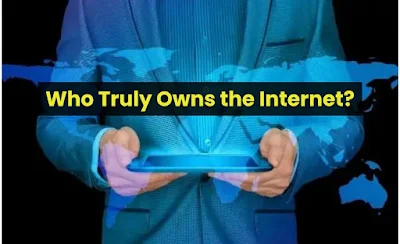Who Truly Owns the Internet?
In the vast expanse of the digital realm, the question of who truly owns the Internet has lingered as one of the most intriguing mysteries of our time. It's a query that sparks curiosity, debates, and even conspiracy theories. As we delve into the intricacies of the online universe, let's embark on a journey to uncover the enigma behind the ownership of the Internet.
The Illusion of a Decentralized Web
At first glance, the Internet appears to be a decentralized network, a collaborative space where information flows freely without a central authority. However, beneath this illusion lies a complex reality. The infrastructure, the backbone of the Internet, is comprised of data centers, servers, and cables, all owned and managed by various entities.
The Role of Governments and Corporations
Governments around the world exert influence over the Internet through regulations, censorship, and surveillance. Corporations, too, play a pivotal role. Tech giants like Google, Facebook, and Amazon control vast portions of online activities, amassing unprecedented amounts of data. While they may not own the Internet outright, their dominance shapes its landscape.
The Birth of ARPANET and the Rise of ICANN
To understand the roots of Internet ownership, we must journey back to the 1960s when ARPANET, the precursor to the Internet, was established. Initially funded by the U.S. The Department of Defense, ARPANET laid the foundation for the interconnected web we know today.
As the Internet expanded, the need for coordination became evident. This led to the creation of the Internet Corporation for Assigned Names and Numbers (ICANN) in 1998. While ICANN manages domain names and IP addresses, it doesn't claim ownership of the Internet itself.
Anonymous Entities and the Cryptic Figures
The intrigue deepens when we consider the possibility of hidden entities or individuals who might hold the keys to the Internet Kingdom. The anonymity surrounding the creation of Bitcoin and blockchain technology has fueled speculation about a shadowy figure known as Satoshi Nakamoto, whose identity remains unknown. Could Nakamoto be a key player in the ownership puzzle?
The Ethereal Nature of Ownership
Unlike physical assets, the Internet's intangible nature complicates the concept of ownership. It is a collective creation of billions of users worldwide, each contributing to its evolution. The lack of a singular owner is both the strength and vulnerability of the Internet.
The Uncharted Territories of Cyberspace
As we navigate the uncharted territories of cyberspace, it becomes evident that ownership of the Internet is a dynamic and evolving concept. The decentralized nature of blockchain and the rise of decentralized autonomous organizations (DAOs) challenge traditional notions of control and ownership.
The Social Contract of the Digital Age
In the absence of a clear owner, a social contract emerges among Internet users. This unwritten agreement relies on mutual trust, collaboration, and adherence to ethical standards. The democratization of information is a fundamental principle, empowering individuals and communities to contribute to the vast tapestry of online content.
For more information check this
Evolution of eSIM Technology: Unlocking the Future of Connectivity
Conclusion: The Internet As a Global Commons
In our quest to uncover the owner of the Internet, we find ourselves standing at the crossroads of technology, governance, and human interaction. The truth is, the Internet belongs to all of us. It is a global commons, a shared space that transcends borders, cultures, and ideologies.
While governments, corporations, and individuals play crucial roles in shaping the Internet, true ownership rests in the hands of its users. It is a collective responsibility to safeguard this digital realm, ensuring its accessibility, openness, and freedom.
In unraveling the enigma of Internet ownership, we discover a dynamic and ever-changing landscape. The journey continues, guided by the principles of collaboration, innovation, and the shared commitment to harness the vast potential of the Internet for the betterment of humanity.




%20(1).jpeg)
Post a Comment